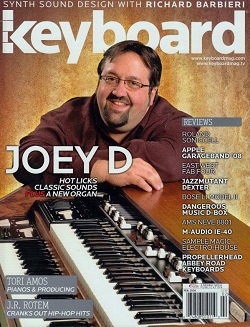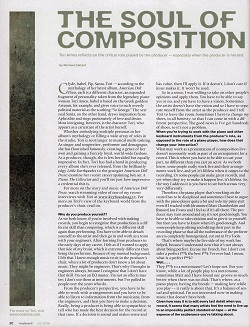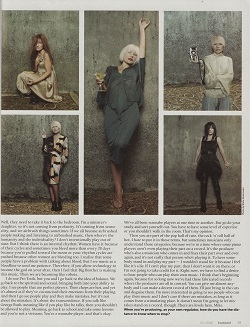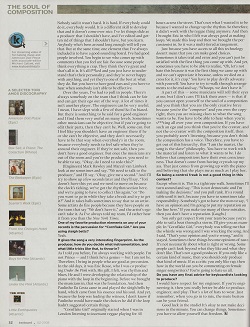|

songs | interviews | photos | tours | boots | press releases | timeline
Keyboard magazine (US)
February 2008
Tori Amos
The Soul of Composition
by Michael Gallant
Clyde, Isabel, Pip, Santa, Tori -- according to the mythology of her latest album, American Doll Posse, each is a different character, an expanded fragment of personality taken from the legendary piano-woman Tori Amos. Isabel is based on the Greek goddess Artemis, for example, and gives voice to such overtly political material as the scathing "Yo George." The sensual Santa, on the other hand, draws inspiration from Aphrodite and sings passionately of love and desire. Most intriguing, however, is the character Tori, who appears as a caricature of the artist herself.
Whether embodying multiple personas in her album's mytholofy or filling a wide array of roles in the studio, Tori is no stranger to musical multi-tasking. As singer and songwriter, performer and demagogue, she has flourished famously, creating a genre of her own and gaining a fiercely loyal, world-wide fanbase. As a producer, though, she is less heraded but equally impressive. In fact, Tori had a hand in producing every album she's ever relesed, form the brilliantly edgy Little Earthquakes to the grungier American Doll Posse; examine her recent career-spanning box set A Piano: The Collection and you'll see just how impressive a credential this is.
For more on the story and music of American Doll Posse, watch the streaming video of one of my recent interviews with Tori at www.keyboardmag.tv. For more on Tori's view of the keyboard world from the producer's chair, read on.
Why do you produce yourself?
As we both know, if you're involved with making records, you begin to recognize that production is a different skill than composing, which is a different still again than performing. You have to be able to detach yourself as the artist and then go in and work as a team with your engineers. After learning from producers in the early days of my career, I felt as if I wanted to apply that side of my brain, which is extremely different than being the performer. Because of my musical background, I felt that I knew enough music to sit in the producer's chair, where a lot of producers don't know a lot about music. They might be engineers. That's why I brought in engineers always, because I recognize that I don't have that skill. I'm not an EQ master. I'm not an effects master; I don't use them as instruments, but I've pulled in people over the years who do.
From the producer's perspective, you have to be able to work with arrangements and you have to be able to listen to information from the musicans, from the engineers, and then you have to make a decision. Really, being a producer is being able to sympathize, to tell who has made the best decision for the record at that time. If a decision is sound and makes sense and has value, then I'll apply it. If it doesn't, I don't care if Jesus makes it. It won't be used.
So in a sense, I was willing to take on other people's opinions and apply them. You have to be able to say yes or no, and you have to have a vision. Sometimes the artist doesn't have the vision and so I have to separate myself from the artist as the producer and tell Tori to leave the room. Sometimes I have to change my shoes, in all honesty, so that I can come in with a different perspective. The good news is I've got hundreds of shoes, so it's not a problem.
When you're trying to work with the piano and other keyboard instruments from the producer's role, as opposed to the role of a piano player, how does that change your interaction?
What may work as a presentation of a composition live doesn't necessarily work as part of an arrangement for a record. This is where you have to be able to cast your part, no different than you cast an actor. As we both know some people really work live and their arrangements work live, and yet it's lifeless when it comes to the recording. Or some people can make great records, and yet when they try to make it happen live, it's lifeless. So, the way I address it is you have to see both arenas very, very differently.
Therefore, the piano player that's working on the record has to be disciplined and sometimes I have to argue with the piano player quite a bit and reo my piano part even if I tracked with [drummer] Matt Chamberlain and [bassist] Jon Evans and I feel as if it's there. The producer may turn around and say it's not good enough. You have to be able to take criticism and give it to yourself. But then you have to know when it's good enough. And some people keep editing their part in the recording phase so that all the exuberance of the performance is completely homogenized, cut out in Pro Tools.
That's where maybe the live side of my work has helped, because I understand now that it's not always about being perfect. Excuse my French, but I don't consider a perfect f**k the best f**k I've ever had. I mean, what is a perfect f**k?
Well....
They f**k to a metronome? Let's hope not. But you know, while a lot of people play to a metronome, sometimes Matt and I have found our groove so much better when there was no click. That's where, as a piano player, having the breath -- making love while you play -- it really s about that. It's a balance of sexual and spiritual. I'm not interested now in making music that doesn't have both.
Given how easy it is to edit every last detail when you record, it seems that many artists feelthe need to live up to an impossibly perfect standard on tape -- at the expense of the exuberance you're talking about.
Well, they need to take it back to the bedroom. I'm a minister's daughter, so it's not coming from profanity. It's coming from sensuality, and we airbrush things sometimes. If we all become airbrushed people making and listening to airbrushed music, then where's the humanity and the individuality? I don't intentionally play out of time. But I think there is an internal rhythm. Women have it because of their cycles and sometimes you bleed more than every 28 days because you're pulled toward the moon or your rhythm cycles are pushed because other women are bleeding, too. I realize that some people have a problem with talking about blood. But I see music as a bloodline to send me patience. Therefore, if you allow technology to become the god on your altar, then I feel that Big Brother is making this music. Then we are becoming like robots.
I do use Pro Tools, but you and I go back to the idea of balance. We go back to the spiritual and the sexual, bringing both into your ability to play. I see people that are perfect players. Their chops are hot, and yet it's almost as if they've circumcised their emotions from their playing. And then I go see people play and they make mistakes, but it's not about the mistakes. It's about the transcendence. If you talk like George Bush, meaning like if you play like he talks, then you shouldn't be allowed to play. Meaning, go back to school and take some lessons and you're not a virtuoso. You're a wannabe player, and that's okay. We've all been wannabe players at one time or another. But go do your study and sort yourself out. You have to have some level of expertise or you shouldn't walk in the room. That's my opinion.
Then you are part of the pop hall of cute, the rock 'n' roll hall of hot. I hate to put it in those terms, but sometimes musicians only understand those categories, because we're in a time where some piano players aren't even playing their part on a record. It's the producer who's also a musician who comes in and fixes their part over and over again, and it's not really that person who's playing it. To have somebody stand in and play my part -- I wouldn't stand for it because I feel like it's a lie. If I can't play my part, then I don't want it on there, or I'm not going to take credit for it. Right now, we have to find a desire to hear people who can play their own music. I think that's beginning again, because for so long now we've had all these fabricated records where the producers are in control. You can give me almost anybody and I can make a decent record of them. I'll just bring in the cats and disguise them. I'm more interested in going to see people who can play their music and I don't care if there are mistakes, as long as it comes from a stimulating place. It doesn't mean I'm going to let mistakes stand on a record, though. There are levels here, Mike.
When you're producing, as your own regulatr, how do you have the distance to know when to stop?
Nobody said it wasn't hard. It is hard. If everybody could do it, everybody would. It is a different skill to develop that and it doesn't come over nice. I've let things slide as a producer that I shouldn't have, and I've edited and gotten rid of things that I shouldn't have, but you learn. Anybody who's been around long enough will tell you that. But at the same time, one element that I've always included is to have a good sounding board. I've had good people involved. You begin to see who comes up with comments that you feel are fair. Because some people thing everything is crap. They think they're great and that's all it is. It's all f**ked and you just have to understand that's their personality, and they're never happy with anything, and yet they're one of the best at what they do. But you have to have good ears and you have to hear when somebody isn't able to be effective.
Over the years, I've had to pull in people. There's always somebody on the team that I think can be fair and can get their ego out of the way. A lot of times it isn't another player. The engineers can be very useful. I mean, I've slept with a few of them! So I'm biased But there is something to be said for a good engineer and I find them very useful on many levels. Sometimes other musicians can be objective, but if you're going to edit their parts, then they can't be. Well, some can. But I feel like you shouldn't have an engineer there if he or she can't be objective, and they don't necessarily have to be that way when everybody's in the room, because everybody needs to feel safe when they're around their engineer. If they're not safe, then you don't have a good engineer. But once the musicians are out of the room and you're the producer, you need to be able to say, "Okay, do I need to redo this?"
[Engineers] Mark Hawley and Marcel van Limbeek look at me sometimes and say, "We need to talk to the producer," and I'll say, "Okay, give me a second." And I'll try to show up a few seconds later and they'll say, "Tori doesn't have this yet and we need to move on because the clock's ticking, we've got the rhythm section here, and we're going to have to collect this again," or "Do you want to go in while they take a break and try to get it?" And it takes balls sometimes to say that to an artist. Some artists do fire people because they have people on the team that say, "We don't have it," and the artist's ego can't take it. As I've always told my team, I'd rather hear it from you than the New York Times.
One of my favorite production elements on any of your records is the percussion for "Cornflake Girl." Are you using sleigh bells?
Yeah.
It gives the song a very interesting fingerprint. As the producer, how do you decide what instrumentation, and what little tricks like that, to throw in?
As I've told you before, I'm always working with people. I'm not Prince -- and I think he's a genius -- but I am not he. Therefore, I bring in people who are good at perciussion. In the old days, it was Eric Rosse, who I was co-producing Under the Pink with. His gift, I felt, was rhythm and blues. He and I were developing the relationship of the piano with the loop in the beginning. Before we brought the musicians in, that was the foundation. And then Paulinho Da Costa came in and played the sleigh bells by hand, which came from his essence and his soul. And yet, because the loop was leading the witness, I don't know if Paulinho would have made the choices he did if the loop hadn't suggested certain things.
"Cornflake Girl" originally started when I was in London listening to incessant reggae playing for 48 hours across the street. That's not what I wanted it to be because I wanted to change up the rhythm. So therefore, it didn't work with the reggae thing anymore. And then I brought Eric in who I felt was always good at making loops. We made this loop and then we brought the percussionist in. So it was a multi-tiered arrangement.
Just because you have access to all this technology doesn't mean that you can make good choices. Sometimes it takes trial and error and you can't just be satisfied with the first thing you come up with. And yet, sometimes you have to be able to realize, "Oh, let's not hate this because it was the first thing we came up with and we can't appreciate it because, unless we dies on a cross for it, it's crap" You have to play devil's advocate with yourself. You have to try to walk through arrangements to the end and say, "Whoops, we don't have it."
A part of this -- some musicians will roll their eyes at me, but I don't care; I'll kick their asses -- is that if you cannot open yourself to the soul of a composition and you think that you are the only creative force because you're the "composer" and you own the copyright, then you are missing clues to what the song wants to be. You have to be able to hear when you're shitting all over your own composition. If you have such an ego and you think that you're the creator, and not the co-creator with the composition itself, then you probably aren't listening, because you don't think the composition has a voice. Therefore, you have to get out of this hierarchy, this "I am the master, the song is the slave" philosophy. You have to work with the material and listen to what it wants to be. I do believe that compositions have their own consciousness. That doesn't come from having crystals up my ass. That just comes from growing up with the piano and believing that she plays me as much as I play her.
So being a control freak is not a good thing in this context?
Except when it is. This is a tightrope walk. Sometimes I'll turn around and say, "This is not democratic and I'm making the decisions," and you pull rank. It's a round table until it isn't, because you have to sometimes take responsibility. Somebody's got to have the nuts to say, "I have an opinion and I'm going to put my reputation on the line here." If you make too many of these mistakes, then you don't have a reputation. [Laughs.]
You only get respect from your team because you're able to sail a boat through a storm. I'll give you an example. In "Cornflake Girl," everybody was telling me that the whistle was wrong and I was wrecking the song. And I said, "That's your opinion and you're wrong," and it stayed. Sometimes these things become opinions of taste. It's not necessarily about what is right or wrong. Some people can't look beyond what they like and what they don't like. That's not a good producer. If you only like a certain kind of music, then you should only produce that kind of music. If as a critic you only like rap, then how in the world can you be commenting on female singer-songwriters? You're going to hate us all.
Do you have any final advice for keyboardists looking to produce?
I would have respect for my engineer. If you're engineering it, then you really better be able to produce, engineer, and play. That's a lot of hats to wear. Just remember, when you go in to mix, the mute button can be your friend.
Good luck in the studio! It's okay to not make decisions in the minute. You can change things. Sometimes you have to allow yourself that freedom.
original article
 


t o r i p h o r i a
tori amos digital archive
yessaid.com
|